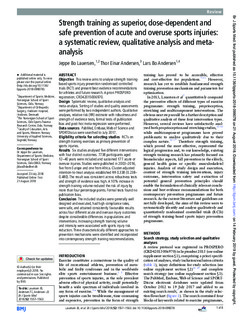Strength training as superior, dose-dependent and safe prevention of acute and overuse sports injuries: A systematic review, qualitative analysis and meta-analysis
Journal article, Peer reviewed
Published version
Permanent lenke
http://hdl.handle.net/11250/2585394Utgivelsesdato
2018Metadata
Vis full innførselSamlinger
- Import fra CRIStin [3621]
- Institutt for idrett, kosthald og naturfag [1006]
Originalversjon
Lauersen, J. B., Andersen, T. E., & Andersen, L. B. (2018). Strength training as superior, dose-dependent and safe prevention of acute and overuse sports injuries: a systematic review, qualitative analysis and meta-analysis. British Journal of Sports Medicine, 52(24), 1557-1563. 10.1136/bjsports-2018-099078Sammendrag
Objective: This review aims to analyse strength training-based sports injury prevention randomised controlled trials (RCT) and present best evidence recommendations for athletes and future research. A priori PROSPERO registration; CRD42015006970. Design: Systematic review, qualitative analysis and meta-analysis. Sorting of studies and quality assessments were performed by two independent authors. Qualitative analyses, relative risk (RR) estimate with robustness and strength of evidence tests, formal tests of publication bias and post-hoc meta-regression were performed. Data sources: PubMed, Embase, Web of Science and SPORTDiscus were searched to July 2017. Eligibility criteria for selecting studies: RCTs on strength training exercises as primary prevention of sports injuries. Results: Six studies analysed five different interventions with four distinct outcomes. 7738 participants aged 12–40 years were included and sustained 177 acute or overuse injuries. Studies were published in 2003–2016, five from Europe and one from Africa. Cluster-adjusted intention-to-treat analysis established RR 0.338 (0.238–0.480). The result was consistent across robustness tests and strength of evidence was high. A 10% increase in strength training volume reduced the risk of injury by more than four percentage points. Formal tests found no publication bias. Conclusion: The included studies were generally well designed and executed, had high compliance rates, were safe, and attained consistently favourable results across four different acute and overuse injury outcomes despite considerable differences in populations and interventions. Increasing strength training volume and intensity were associated with sports injury risk reduction. Three characteristically different approaches to prevention mechanisms were identified and incorporated into contemporary strength training recommendations.

